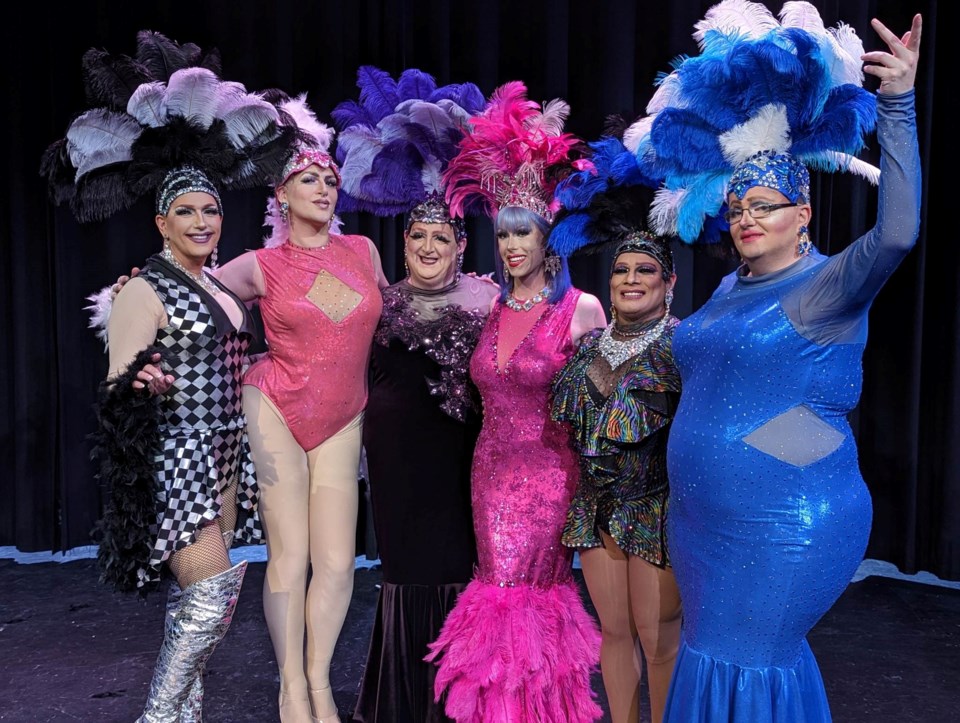When E'Claire Devereaux came to Newmarket seven years ago, she wasn't herself.
A health scare led to her leave Toronto, which meant also leaving the strong drag queen community of which she had become a part, and that left a void in her life.
“I didn’t even do drag the first several years I was here,” said Devereaux, drag mother of the Devereaux Dolls Drag Family. “I had set my makeup table up and everything, but I couldn’t bring myself to go back to drag. I had blacklisted it in my brain.”
Then, she began working with York Pride and that slowly led her back to her passion of drag.
“I started volunteering to get out of my shell again,” Devereaux said. “Word got around that I was a drag queen and that’s all it really took. They asked me to be an entertainer at a Pride party and that’s when I met my first drag daughter, Athena... The rest is history, it just kind of went from there.”
A drag family is a group of like-minded drag performers who similar values and goals and work together to put on performances.
In 2007, Devereaux had decided she wanted to start a drag family after representing Canada at a show in Chicago. She had promised herself if she ever got to that level she would start looking for a drag family, and Haus of Devereaux was born.
Initially in Toronto, Devereaux’s move to Newmarket meant reaching a new audience and finding a new family.
It took several years for Devereaux to find and select her drag daughters. She was looking for the right combination of drag performers committed to finding music and costumes that fit them all, while bringing energy to the stage during their performances.
“You want to see that laughter, the fun, the gleam in the eye,” she said. “I need to see something internal that gives you your energy on stage. A lot of times with the girls I have, it was just a matter of going to their shows and seeing them progress.”
It truly is a family with Haus of Devereaux, where Devereaux is drag mother to Jemm Doshay, Justine D'as, Carmen Del Rae, Athena Vegas, and apprentice Queenie ZaDhal.
“I train them to be the kind of entertainers that I hope to see in the world,” said Devereaux. “I’ve been blessed with my daughters.”
You have to be invited, and Devereaux, who is of the “old-fashioned theatre mind,” said there can be a steep learning process.
“During the apprentice program, they’re taught everything from basic make-up skills to picking appropriate music for their body type and voice, to booking a show — all of this stuff is important to a successful drag show,” said Devereaux. “We’re teaching everything so when they do their final exam they’re able to book the venue, get ticket sales together, promote the show, and cast it.”
After two years with Haus of Devereaux, drag queens are educated on every facet of putting on a performance so that they’re able to move on as a full-fledged entertainer.
“The nice thing about having a drag family is all of these efforts stay working together,” said Devereaux. “We work with a lot of outside groups and do a lot of charity work for various fundraisers and it’s nice because we all feed off each other and have that same energy in the family. The girls all support each other.”
One of the most important aspects of drag to Haus of Devereaux is the history of drag queens supporting others.
“Drag queens have always been the keeper of the records,” said Devereaux. “It was drag queens that fundraised for HIV medication, it was drag queens that fundraised for patients that would be homeless to make sure they were fed. It’s always been drag queens that were at the centre supporting the community to make sure they had what they needed. Even now, charities need fundraisers they bring drag queens in because we’ll put on an incredible show and raise money. Regardless of the era, people could always go to drag queens when they needed help and support.”
As drag continues to assimilate into more mainstream culture, Devereaux sees it becoming more widely accepted, which gives drag performers a larger platform to support charities and social issues.
“We still use our platform to promote things we believe in and trust in,” said Devereaux. “The lovely thing is it’s now becoming more open to a general audience and people are a little bit more accepting even though you’ll always have that negativity.”
Devereaux believes that a lot of the hate speech spewed about drag queens comes from the ill informed. She mentioned a specific time in Georgina where two protesters came in to watch a story time and apologized and left upon realizing there was nothing to it other than friendly faces reading to children.
“A lot of people look up to drag queens because we’re constantly fighting just for our rights as entertainers,” said Devereaux. “People will see a drag queen doing a drag queen story time and say, ‘they’re going to take my children.’ A lot of that is ignorance and people not knowing what’s going on. We talk to a lot of protesters to try to educate them. Someone is always going to have a problem with what we do, our job is to just make sure we keep going.”



